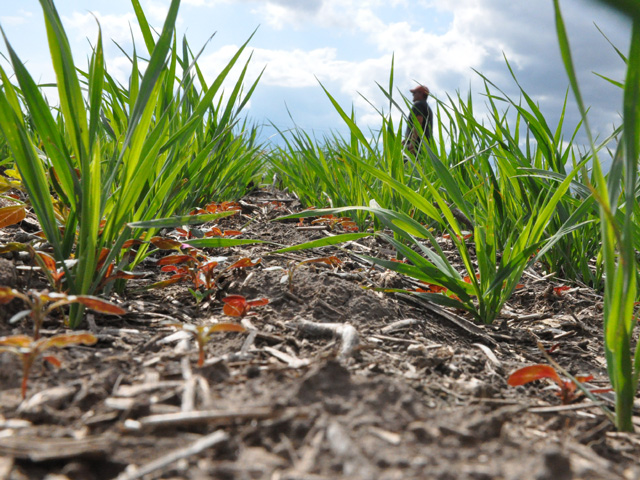Cover Crops Get Insurance Perk
USDA to Give $5-Per-Acre Premium Benefit to Growers Using Cover Crops in 2021
MT. JULIET, Tenn. (DTN) -- A new, pandemic-related program from USDA will give farmers a $5 premium benefit on their crop insurance for planting cover crops.
On Tuesday, USDA announced the Pandemic Cover Crop Program (PCCP), which is being offered by the Risk Management Agency (RMA) to help farmers maintain their cover crop systems despite financial challenges posed by the pandemic.
"Cultivating cover crops requires a sustained, long-term investment and the economic challenges of the pandemic made it financially challenging for many producers to maintain cover crop systems," said RMA Acting Administrator Richard Flournoy in a news release. "Producers use cover crops to improve soil health and gain other agronomic benefits and this program will reduce producers' overall premium bill to help ensure producers can continue this climate-smart agricultural practice."
The PCCP is part of USDA's pandemic assistance initiative, which is a bundle of programs to provide financial assistance to farmers and ranchers amid the market disruptions posed by COVID-19. Those programs include the Coronavirus Food Assistance Program (CFAP) as well as others. You can read more about those efforts here: https://www.farmers.gov/…
P[L1] D[0x0] M[300x250] OOP[F] ADUNIT[] T[]
There are some restrictions and caveats as well as additional paperwork and deadlines producers must meet.
PCCP provides premium support to producers who insured their spring crop and planted a qualifying cover crop during the 2021 crop year. The premium support is $5 per acre but cannot be more than the total premium owed to the farmer's crop insurance provider.
Three states -- Illinois, Indiana and Iowa -- already have programs that provide premium benefits to producers who grow cover crops. In these states, the $5 per acre benefit will be in addition to the state programs.
All cover crops reportable to FSA are eligible. This includes cereals and other grasses, legumes, brassicas and other non-legume broadleaves as well as mixtures of two or more cover crop species that are planted at the same time.
Most crop insurance policies are eligible, including the revenue protection and area protection products that are most popular among Midwestern row-crop growers. However, there are some that are not. PCCP is not available for Whole-Farm Revenue Protection, Enhanced Coverage Option, Supplemental Coverage Option or Hurricane Insurance Protection -- Wind Index policies. Staked Income Protection (STAX) and Margin Protection (MP) policies are only eligible when insured as a standalone policy, not when they're endorsements to an underlying policy.
PCCP does not change acreage reporting dates, reporting requirements or any other terms of the crop insurance policy, but a produce must file their Report of Acreage form (FSA-578) with the Farm Services Agency by June 15, 2021. That's different than the typical filing date. Cover crop fields reported on the form must match what the producer reported to their insurance company. For more information on filing the form, USDA encourages producers to contact their USDA Service Center.
Additional information on the PCCP, including a list of frequently asked questions, can be found at https://www.farmers.gov/….
Also, the Natural Resources Conservation Service made the determination not to update its conservation practice standards for cover crops. NRCS originally proposed restrictions on mechanical harvest of cover crops but decided against going forward after reviewing input from agricultural producers and groups.
Katie Dehlinger can be reached at katie.dehlinger@dtn.com
Or you can follow her on Twitter at @KatieD_DTN
(c) Copyright 2021 DTN, LLC. All rights reserved.




